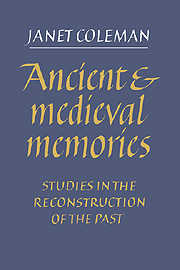Book contents
- Frontmatter
- Contents
- Preface
- List of abbreviations
- PART I THE CRITICAL TEXTS OF ANTIQUITY
- Introduction
- PART II THE PRACTICE OF MEMORY DURING THE PERIOD OF TRANSITION FROM CLASSICAL ANTIQUITY TO THE CHRISTIAN MONASTIC CENTURIES
- Introduction
- 8 The early monastic practice of memory: Gregory the Great; Benedict and his Rule
- 9 Bede, monastic grammatica and reminiscence
- 10 Monastic memory in service of oblivion
- 11 Cistercian ‘blanched’ memory and St Bernard: the associative, textual memory and the purified past
- 12 Twelfth-century Cistercians: the Boethian legacy and the physiological issues in Greco-Arabic medical writings
- PART III THE BEGINNINGS OF THE SCHOLASTIC UNDERSTANDING OF MEMORY
- Introduction
- PART IV ARISTOTLE NEO-PLATONISED: THE REVIVAL OF ARISTOTLE AND THE DEVELOPMENT OF SCHOLASTIC THEORIES OF MEMORY
- Introduction
- PART V LATER MEDIEVAL THEORIES OF MEMORY: THE VIA ANTIQUA AND THE VIA MODERNA.
- Introduction
- Conclusion: an all too brief account of modern theories of mind and remembering
- Bibliography
- Index
11 - Cistercian ‘blanched’ memory and St Bernard: the associative, textual memory and the purified past
Published online by Cambridge University Press: 06 January 2010
- Frontmatter
- Contents
- Preface
- List of abbreviations
- PART I THE CRITICAL TEXTS OF ANTIQUITY
- Introduction
- PART II THE PRACTICE OF MEMORY DURING THE PERIOD OF TRANSITION FROM CLASSICAL ANTIQUITY TO THE CHRISTIAN MONASTIC CENTURIES
- Introduction
- 8 The early monastic practice of memory: Gregory the Great; Benedict and his Rule
- 9 Bede, monastic grammatica and reminiscence
- 10 Monastic memory in service of oblivion
- 11 Cistercian ‘blanched’ memory and St Bernard: the associative, textual memory and the purified past
- 12 Twelfth-century Cistercians: the Boethian legacy and the physiological issues in Greco-Arabic medical writings
- PART III THE BEGINNINGS OF THE SCHOLASTIC UNDERSTANDING OF MEMORY
- Introduction
- PART IV ARISTOTLE NEO-PLATONISED: THE REVIVAL OF ARISTOTLE AND THE DEVELOPMENT OF SCHOLASTIC THEORIES OF MEMORY
- Introduction
- PART V LATER MEDIEVAL THEORIES OF MEMORY: THE VIA ANTIQUA AND THE VIA MODERNA.
- Introduction
- Conclusion: an all too brief account of modern theories of mind and remembering
- Bibliography
- Index
Summary
Remember thee!
Ay, thou poor ghost, while memory holds a seat
In this distracted globe. Remember thee!
Yea, from the table of my memory
I'll wipe away all trivial fond records,
All saws of books, all forms, all pressures past,
That youth and observation copied there,
And thy commandment all alone shall live
Within the book and volume of my brain
Unmixed with baser matter, – yes by heaven!
Shakespeare, Hamlet 1.5Benedictine monasticism was enlivened, enriched, re-thought by the Cistercians in the twelfth century. Much more than the black monks, these white monks set out to live a life detached from contemporary social and economic developments. In theory and practice, early Cistercian abbeys remained self-contained units divorced from ecclesiastical, political–feudal ties, with a unanimity of observance. Theoretically at least, they possessed a clear and detailed uniform code throughout the Order according to which departure from the expressed norm could be corrected by the frequent visitations of abbots. They consciously divested themselves of the accretions of customs to which they believed black monks had needlessly and excessively succumbed. They saw as their primary task the organisation of a self-contained common life for their monastic family centred round labour, reading and prayer, Therefore, they radically shortened the Cluniac liturgy. In the early days, contact with commerce and trade was almost nil.
- Type
- Chapter
- Information
- Ancient and Medieval MemoriesStudies in the Reconstruction of the Past, pp. 169 - 191Publisher: Cambridge University PressPrint publication year: 1992

